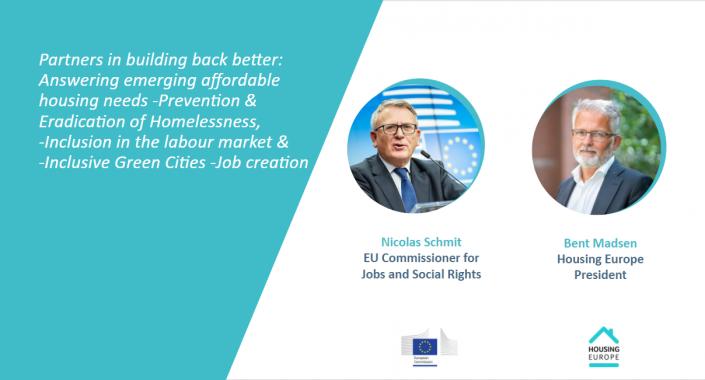EU Commissioner, Nicolas Schmit and Housing Europe with a vision on how to improve social cohesion
A sneak-peek at the first findings of the ‘State of Housing in the EU’ report
Brussels, 11 February 2021 | Published in Social, Future of the EU & Housing
The strong evidence of a severe housing crisis, exacerbated by the global health pandemic, has triggered political action and made the need for decent, affordable, social housing widely recognised. As a result, today, key EU institutions, such as the European Commission, the European Parliament, the Committee of the Regions have put affordable homes high on their agendas. Based on the first preliminary findings of our ‘State of Housing in the EU’ report about the post-COVID housing reality, the Commissioner for Jobs and Social Rights, Nicolas Schmit, Housing Europe’s President, Bent Madsen and the Housing Europe team in Brussels met early on 10th February to discuss how we can build back affordable homes better.
Bent Madsen opened the session by stressing the common goals of the sector in achieving inclusive housing systems and labour markets, eradicating homelessness and greening cities.
The first insights the 2021 ‘State of Housing EU’ report, which will be launched on March, 26th, show that while we are not yet fully grasping the impact of the pandemic, we see clear signs that COVID-19 will affect significantly our societies for the years to come. Housing Europe’s Research Director, Alice Pittini explained that the growing unemployment rates leading to a higher risk of poverty and exclusion will inevitably increase the demand for social and affordable housing, making the already long waiting lists even longer. She also highlighted the role of social, cooperative and public housing during the pandemic as they act as a safety net, providing essential services and maintaining tenants in financial difficulties in their homes.
“It was already quite gloomy before and it has turned problematic and even darker due to the pandemic. If something is gloomy, you have to be more ambitious and you have to find bold solutions because housing is in the centre of our social dimension,” Commissioner Nicolas Schmit said. He also added that beyond fighting homelessness, which is the most radical form of housing exclusion, structural solutions need to be found to respond to the fact that housing has become a speculative element and that housing affordability has become an issue even in countries where people are rather well-remunerated and wages are decent. Speaking about the investment made available via the Next Generation EU plan for recovery, Nicolas Schmit also called for spending to be accelerated and to keep an eye on the impact the investment will have on the economy and jobs. “In the context of the crisis and the recovery, in many countries, housing is a social, economic issue, an issue also for the social cohesion. It is clear that we have to invest and strengthen social housing,” the Commissioner said. He also reminded of the importance of having affordable housing of high quality in order to contribute to our climate objectives.
Housing Europe’s Secretary General, Sorcha Edwards echoed the fact that achieving major goals of the sector including social inclusion, a fairer labour market and the greening of homes and cities would indeed be supported through increased policy coherence at EU level. She called on the European Commission to anchor the ‘do-no-social-harm’ principle, meaning to ensure that EU policy should be drafted in a way that enables national policies to put people at the centre.
Relating to the potential of the European Pillar of Social Rights to be a true guiding principle of EU policies, our Secretary General proposed the set up of an ‘EU Post-COVID Social & Affordable Housing Expert Group or Forum as part of the Social Pillar action plan’ to “bring ministries, cities, stakeholders together to see how our housing systems help meet those objectives, linking it to Bauhaus and the Affordable Housing Initiative under the Renovation wave and to make sure that these initiatives have a clear social stamp mainstreaming the goal of reaching decent housing access to all.” With the need to meet and discuss more regularly on how to make housing a fundamental right again, Housing Europe also suggested the organisation of an EU Social & Affordable Housing Summit that offers a platform for exchange, improving capacity building and exchange between Member States on EU funding for housing, as well as to establish a link with the European Commission’s inter-service group on housing.
“Housing is a European problem with national and local solutions. The EU can help to put together all the actors and have good exchanges of views and practices, to have positive dynamic,” Nicolas Schmit said in conclusion and left public, cooperative and social housing providers with the feeling that they do not have to answer to emerging affordable housing needs in silos.
Watch this space as more initiatives that promise to deliver better homes and future are in the pipeline.